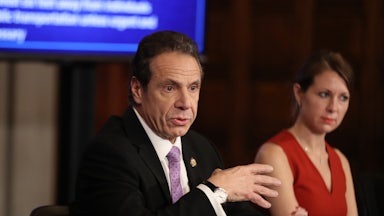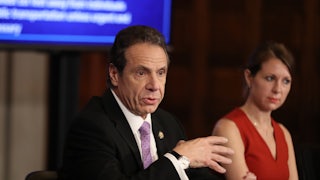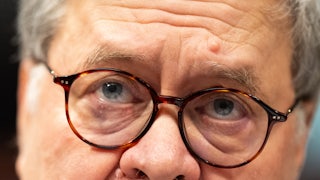For the last 10 years, Andrew Cuomo has held onto power by bullying and belittling everyone in his path. He has been ruthless, taking on and taking out opponents of all stripes—though particularly on his left—with relish and cynicism. Whether you’re a left-wing political figure, a journalist, or the mayor of the nation’s biggest city, it didn’t matter. Any infraction, however minor, would be met with full and unrelenting force.
And for 10 years, Cuomo surrounded himself with like-minded enforcers eager to spend nights and weekends berating anyone who dared criticize New York’s governor. He also remade New York’s Democratic Party in his own image, exerting maximum control, taking down rivals, and, until recently, keeping the left in check. Albany was a foreboding and transactional place long before Andrew Cuomo got there; it has grown exponentially darker over the last decade. And yet, the greatest trick that the imperious Cuomo pulled was successfully play-acting as a model progressive, and an advocate for women’s rights. (He did, after all, found the “Women’s Equality Party,” a malevolent attempt to punish the Working Families Party for disloyalty.) In 2019, he channeled Louis XIV, telling his progressive critics, “I am the left.”
It was no surprise that Cuomo’s response to the barrage of sexual harassment allegations that have crippled his administration throughout 2021 was to punch back and play the victim. After New York attorney general Tish James released a damning, 165-page report outlining Cuomo’s long history of sexual harassment, his targeting of attractive women (including a New York state trooper) to work near him, and the astonishingly toxic culture of his Albany workplace, Cuomo’s response was to muddy the waters. Over a montage of the governor hugging and kissing his famous friends, Cuomo insisted that he wasn’t a creep—he was simply a handsy Italian American. “I do it with everyone,” Cuomo said. “Black and white, young and old, straight and LGBTQ, powerful people, friends, strangers, people who I meet on the street.” His administration then attempted to rebut James’s report with its own report, which consisted of dozens of pages of photographs of politicians hugging and kissing people.
It was also a message to his critics: If you want me out, you’re going to force me out. For months, the governor had managed to cling to just enough political power to hold onto his office: Though despised in the state Senate, he still had enough protectors in the Assembly. He still had powerful unions on his side. He still had millions in the bank that he could disperse to those willing to slow-walk impeachment. The James report depleted all of these resources, save for the money. His allies belatedly abandoned him. Cuomo was on an island. Even his attack dog and closest adviser, Melissa DeRosa, jumped ship. Still, he bared his teeth and stood his ground, insisting that he would have to be forced out; that only he could fix the mess that he had made.
All of that came to an end during a surprise press conference Tuesday afternoon, at which Cuomo essentially submitted his two-weeks’ notice. It was at once inevitable and shocking. It was inevitable because his impeachment had finally started rolling; after months of delay Cuomo was finally going to be forced out of office. It was shocking because Cuomo had always fought back; preferring never to give an inch and salt the earth behind him as he went. His “total war” approach to politics has been bad for New York, but it has been good for Andrew Cuomo. He was, like fellow Queens-born Donald Trump, someone you could only imagine being dragged out of office.
His resignation was, nevertheless, textbook Andrew Cuomo. The departing governor insisted that he was a paternal figure, who loved his subjects dearly and hated to go. He insisted that he was the real victim, that he was misunderstood by those who have made allegations against him. He insisted that what was really happening was a partisan witch hunt concocted by his enemies to damage not only him but the Empire State itself. And yet, the ever-selfless Cuomo would step aside, even amidst cancellation, for the health of the body politic and the literal health of the state’s citizens.
“It is a matter of life and death,” Cuomo said. “Government operations and wasting energy on distraction is the last thing government should be,” Cuomo said. “I cannot be the cause. New York tough means New York loving. And I love New York, and I love you. Everything I have ever done has been motivated by that love, and I would never want to be unhelpful in any way.”
Above all, he conceded absolutely nothing. “This situation and moment are not about the facts, are not about the truth, are not about thoughtful analysis. It’s not about how we make the system better,” he said. “This is about politics and our political system today is too often driven by the extremes. Rashness has replaced reasonableness, loudness has replaced soundness, Twitter has become the public square for policy debate.”
It is an astonishing reversal but also one freighted with almost mythic weight. Cuomo’s downfall is a story of Empire State–size hubris. For a decade, Cuomo has ruthlessly amassed power and control—and enemies. This time last year, Cuomo had the air of someone untouchable. Lavished with praise by a news media eager to find counterprogramming to the flood of information emanating from the Trump White House at the peak of the pandemic and a foil to the president himself, it latched onto Cuomo as a gruff, competent, and caring alternative. Even as evidence mounted that he had presided over the pandemic with the same Trumpian misrule, he became a national sensation; he was given a $4 million book deal. And he was so confident, he had his staff work on that book while they were ostensibly doing the state’s business—a possible violation of New York state law. And then, it all came crashing down.
Kathy Hochul, the state’s lieutenant governor, will take over in two weeks, and she will inherit a mess of Cuomo’s making. For 10 years, he has destabilized the state to ensure that he had total control over nearly every aspect of policymaking. He turned New York’s already jaundiced politics into a reflection of his own ego and self-interest. Now, after a decade, Cuomo’s reign is finally over. Whatever new era of the state’s politics is to begin, it will have a rough start.








